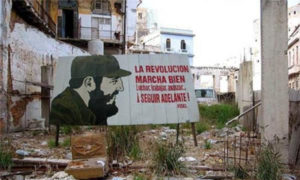*By Jaime Suchlicki

Faithful to Lenin’s ideas that the school should “educate and prepare members of the Communist society,” the Castro revolution has used education as the instrument to build a new society – to develop the socialist man.
The creation of the new man required a change in the values and attitudes of most Cubans. Allegiance had to be transferred from the family to the party and to the fatherland. The faltering influence of the Church had to be eliminated completely. The aversion of the Cubans to manual labor, together with the tradition that women’s place was in the home, had to be eradicated. The belief that events were determined by nature had to be transformed. And finally, the orientation toward the present had to be modified.
The new man and the new society envisioned by the Castro brothers would have to be significantly different. Devotion to the cause of communism and love of the fatherland would prevail. Man consciously would labor for the welfare of society. Each would work for all and all for each. The collective interest would supersede the individual one. Racial prejudices would be eliminated. Honesty and truthfulness would guide everyone’s life. The young would be taught to respect and admire party leaders, especially Fidel Castro, and to obey party discipline. High consciousness of social duty and intolerance of violations of social interest would predominate. The new socialist morality would retain those characteristics developed by Castro’s Rebel Army while fighting in the mountains against the Batista dictatorship. They included abnegation, a spirit of sacrifice, courage, and discipline. Speaking to a graduating class of teachers and after emphasizing that communism was not only a question of developing material wealth, but also of developing human awareness, Fidel described the type of man his regime proposed to create: “We will bring up human beings devoid of selfishness, devoid of defects of the past, human beings with a collective sense of effort, a collective sense of strength.”
The new society would be abundant in material wealth. But man would be less concerned with obtaining material goods for himself. He would rather work to produce for the whole society. Not only is society to be abundant in material wealth, but money would be done away with. In a speech to the association of small farmers Castro explained his dream: “…there will arrive the day when money will have no value. Money is a vile intermediary between man and the products man creates.”
Not only money but other material incentives would be eliminated. Recalling Che Guevara’s preaching emphasizing the superiority of moral over material incentives, an editorial in Granma, the official newspaper of Cuba’s Communist Party, lashed at “economism,” which it described as “the tendency to consider that men produced more and better as they received more and better.”
In foreign affairs the Cuban masses would have to be irreconcilably opposed to the enemies of the fatherland, especially to the United States. The Cubans would show solidarity with the peoples of developing countries, of the socialist camp, and particularly, of Latin America as well as friendship and brotherhood toward the peoples of the Soviet Union.
All efforts had to be directed toward committing the younger generation to these principles. If the drive to create the new man failed, then the revolution would fail too. For the creation of the ideal society depended on the success of the educational system. The millennium could not be reached without creating the proper attitudes. And the Castro regime seemed convinced that under the direction of the party education could be used as an indispensable tool in developing the new socialist man.
More than sixty years of revolution have failed to develop “the new man”. The Cuban that has emerged has some of the vices of the past and many new ones. These include stealing from state enterprise; working little; unwillingness to sacrifice for the future; opposition to party directives and lack of loyalty to the leadership. In particular the hoped-for hatred of the U.S. and capitalism has not materialized. After six decades of Communism, the Cubans seem to admire the U.S. and its economic system. Many prefer to live in the U.S. than in Cuba’s Socialist paradise. The new Cuba envisioned by Fidel, Raul, Che is nowhere to be found!
*Jaime Suchlicki is Director and founder of the Cuban Studies Institute, CSI, a non-profit research group in Coral Gables, FL. He is the author of Cuba: From Columbus to Castro & Beyond, now in its 5th edition; Mexico: From Montezuma to the Rise of the PAN, 2nd edition, and Breve Historia de Cuba. He is a highly regarded consultant to the public and private sectors









1 comentario en “The Making of the “New Socialist Men” in Cuba”
Muy buen ariticulo abordando el tema del supuesto hombre nuevo. Por favor presentelo en español para poder mandarlo a personas que no lo pueden entender en ingles. Gracias.
Los comentarios están cerrados.